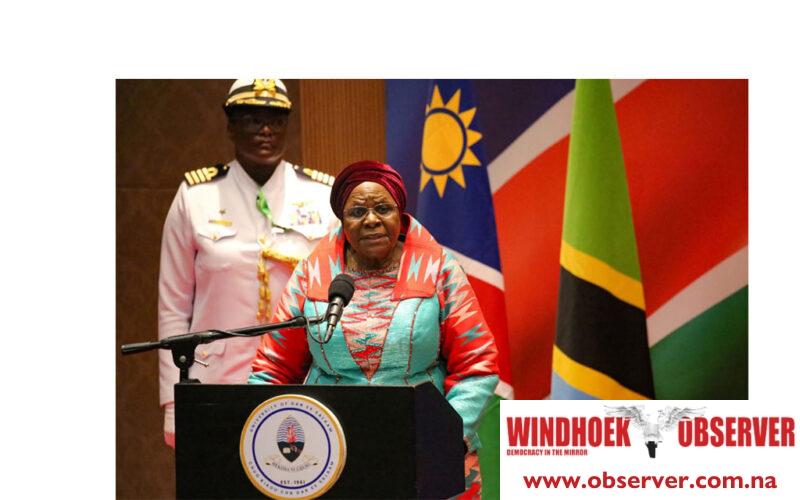Niël Terblanché
President Netumbo Nandi-Ndaitwah, while on a working visit to Tanzania earlier this week, delivered a lecture at the University of Dar es Salaam, where she called on young African women to pursue leadership positions with focus and self-belief.
Speaking under the theme “Inspiring Women to Break Barriers in Leadership Positions: A Personal Experience from Dr Netumbo Nandi-Ndaitwah”, the Head of State recounted her journey from a quiet rural girl to Namibia’s first female president.
“Leadership skills are not determined by gender,” she told attendees, insisting that both men and women are capable of contributing equally to national development.
“We cannot all become presidents. But for our engagement today, women and girls, your destiny is yours. I can also assure you that with focus and discipline, you can realise your dreams.”
Returning to the university where she received an honorary doctorate in 2020, Nandi-Ndaitwah described education as a key to emancipation, referencing the university’s motto, “Hekima ni Uhuru” — “Wisdom is Freedom.”
She stressed that education was deliberately denied to the oppressed under colonial systems as a means of domination.
“When you colonise the mind, you conquer a person,” she said.
Evoking Namibia’s struggle against German colonial and South African apartheid regimes, she paid tribute to those who sacrificed their lives.
She noted that the first armed resistance within Namibia in 1966 was a pivotal moment, and credited Tanzania, especially under the leadership of Julius Nyerere, for being a vital base of support for Namibia’s liberation movement.
“We, the people from Southern African countries, will remain indebted, and will cherish the support and contribution made by the Tanzanian people to our freedom,” she said.
Nandi-Ndaitwah told attendees that she began political activism at the age of 14 and was elected chairperson of the Swapo Youth League in northern Namibia during the early 1970s.
Her early leadership came at a cost. She was arrested in 1973 and imprisoned for six months.
“Having spent six months in prison, I was released on a one-year suspended sentence,” she said.
Soon after her release, she led a group of young Namibians into exile in Zambia, which launched her international political career.
That same year, at just 21 years old, she addressed the United Nations Decolonisation Committee in New York.
“It was not my first encounter with the UN,” she said, recounting earlier meetings with Secretary-General Kurt Waldheim and his representative Alfred Escher during visits to Namibia in 1972.
She described her eventual appointment as Swapo’s chief representative to central Africa and later east Africa, during which she became the movement’s only female diplomatic representative.
Following independence in 1990, Nandi-Ndaitwah served in various ministerial positions, including foreign affairs, environment and tourism, and women’s affairs.
She was elected vice president of Swapo in 2017 and vice president of Namibia in 2024, culminating in her inauguration as President in March 2025.
Reflecting on her career, she said: “While the above may be seen as self-praise, that’s the reality of my long and bumpy journey to reach where I am today.”
She pointed to the historic shift in Namibia’s political landscape, noting that women currently occupy the offices of President and vice president of the country, as well as president and secretary-general of Swapo party.
“It is why today we have historic feats with females who are occupying the highest positions in both the government and the Swapo party,” she said, insisting that these developments must serve to inspire younger generations.
To those still doubting whether women can lead, she pointed to leaders such as Ellen Johnson Sirleaf of Liberia, Joyce Banda of Malawi, Sahle-Work Zewde of Ethiopia, and Tanzania’s President, Samia Suluhu Hassan.
“She is a great testimony that women can be strong leaders, just like their male counterparts,” she said of her host.
Nandi-Ndaitwah concluded her address by calling on both male and female students to support capable women seeking leadership roles.
“Do not be discouraged by anyone when you want to occupy any leadership position in life. Follow your dreams. The world is evolving, and the time is now for you to seize opportunities.”
She added that if there is a woman who is capable and fit for the position, she should be given an opportunity to prove herself, and she has to be given support by men as well, not by women only.
Her lecture served not only as a personal reflection but also as a call to action.
The Namibian Head of State urged the new generation of African women to overcome all structural barriers and claim their place at the helm of public life.




